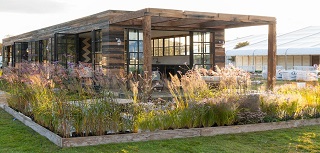From Guest Blogger Lizzie Weakly: How Insulated Glass Can Make Your Home More Energy Efficient

No Greenhouse Effect
Heat can enter a home in two different ways, through airflow and through radiation. Sunlight that streams through glass can make your home very hot, even without any air leaks. Double and triple pane windows with a layer of an inert gas in between each layer can do a lot to avoid allowing radiant heat through your window panes. There is an added bonus in that this can also allow you to keep your furniture and flooring from fading in the UV light. Today’s windows also have specialized UV coating to add to the protective value even more.
Insulative Properties
You probably already understand that glass is not typically as good an insulator as other materials like fiberglass insulation, drywall, wood and stucco siding. That said, when you begin to layer multiple panes of glass together and add pockets of sealed air in between, then you will begin to compare with the R-values, or insulative values, of insulated walls.
Moisture Protection
Windows that let air into a home are typically also letting moisture in. This can mean that you must add air circulation and dehumidifying properties to your home in order to prevent it from getting mildew or water damage from condensation. By choosing windows that prevent the intrusion of humidity and rain, you can do a lot to protect both your home and your power bill.
Renovate vs Refit?
In some cases, you may be able to replace your existing windows with a better version to seal air leaks around the outside, add more insulative layers and increase UV protection. In other cases, you may need to replace both the windows and the external casing. A glass expert like Glasshopper Schor Glass can typically come out and give you an idea of what is feasible. The choice you must make can depend on a number of factors including the condition of the existing windows and whether or not they are currently to code.
There are many reasons to reconsider your windows. If you are unsure whether the work and the cost will pay for itself, one of the best ways to find out is to speak with a glass expert. They will often come and give you free estimates and help you to understand what that can translate to in energy efficiency as well as savings for you.

Good advice. However, regardless of the quality of the windows, they still reduce the energy efficiency of a house. Of course we all want windows, but we really should consider that they are not good for energy efficiency and therefore should not go overboard on fenestration.
The direction in which windows face greatly influences their effect on energy efficiency. Where practical, awnings can reduce heat gain and the need for air conditioning. A large roof overhang can also be helpful.
As usual Frank delivers good insights into the whole house approach to better energy efficiency.
The awnings Frank mentioned are now being included in Progressive Utility Demand Side rebate programs. Load studies have measured a 300 watt to 400 watt reduction for windows that face West and South West.
That is a aggregate value for a group of windows facing West or S West.
The day is coming in the next 5 years or so where Hi Tech BIPV windows will be on the market for tract homes. These will have PV electric generating capability built into the windows. This will be a big game changer .
Just another reason that end use demand for utilities will continue to go down. Solar will have many different formats in the near future. Germany has these windows now.